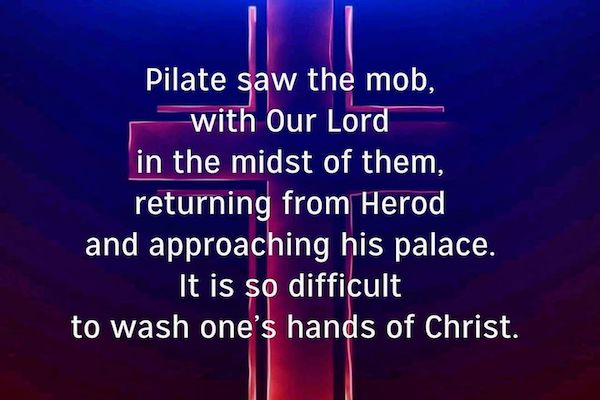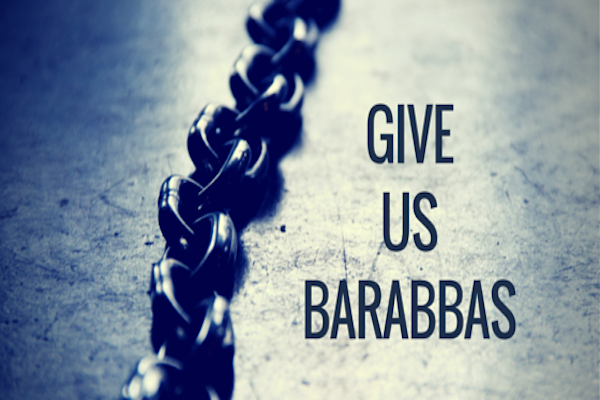LENT 2024: Day 28 - LIFE OF CHRIST

LENT 2024: DAY 28 - Saturday March 16
“Pilate saw the mob, with Our Lord in the midst of them, returning from Herod and approaching his palace. It is so difficult to wash one’s hands of Christ. Obliged to sum up the case before the people, Pilate returned to the primary charge that He had been perverting the people, and proclaimed: “I examined Him in your presence, and could find no substance in any of the charges you bring against Him; nor could Herod, when I referred you to him. It is plain that He has done nothing which deserves death.” (Luke 23:14-15)
Apparently both judges were convinced that, regardless of the report that had been circulated, the Prisoner was guiltless. For a second time, He was declared innocent. Pilate, knowing that the Jews had delivered Christ out of envy, sought another escape from condemning Him. The Sanhedrin actually supplied the excuse by reminding him that it was the custom at the Passover to release a prisoner. There was languishing in jail at the time a “notable” prisoner, Barabbas. This man was a leader of the Jewish underground against the Romans. For both sedition and a murder committed while leading a revolution against Rome, he was put in jail.
Pilate was very clever; he sought to confuse the issue by choosing a prisoner who was guilty of exactly the same charge they brought against Christ, namely, sedition against Caesar. In a few minutes, two figures stood before the multitude on the white marble floor of the praetorium. Pilate sat on a raised platform, surrounded by the imperial guard. Barabbas, on one side, blinked in the sunlight. He had not seen it in months. On the other side sttod Christ Here were two men accused of revolution Barabbas appealed to national grievances; Christ to conscience. The trumpets sounded. Order was restored. Pilate stepped forward and addressed the mob: “Whom shall I release? Barabbas, or Jesus Who is called Christ?” (Matthew 27:17)
The question of Pilate had all the air of democracy and free elections, but it was only its cheap facsimile… The people themselves were not inclined to put Our Lord to death. For that reason some demagogues “had persuaded the multitude to ask for Barabbas.” (Matthew 27:20)… The people can be misled by false leaders; the very ones who shout “Hosanna” on Sunday can shout “Crucify” on Friday.
What happened on that Good Friday morning was that through propagandists the people became the masses. A democracy with a conscience became a mobocracy with power. When a democracy loses its moral sense, it can vote itself right out of democracy. When Pilate asked: “Whom shall I release?” (Matthew 27:17)… the masses thundered back: “Barabbas.” (Matthew 27:22)
Pilate could hardly believe his ears… “But the whole concourse raised the cry, ‘Away with this Man; we must have Barabbas released.’” (Luke 23:18) “Once more Pilate answered them, ‘What would you have me do, then, with the King of the Jews?’” (Mark 15:12) “He offered to set Jesus at liberty; but they continued to answer with shouts of, ‘Crucify Him, crucify Him.’” (Luke 23:20-21) “Then for the third time he said to them, ‘Why, what wrong has He done? I can find no fault in Him that deserves death; I will scourge Him, and then He shall go free.’ But they, with loud cries, insisted on their demand that He should be crucified; and their voices carried the day; Pilate gave his assent that their request should be granted, releasing the man of their choice who had been imprisoned for revolt and murder.” (Luke 23:22-25)
The majority is not always right. Majority is right in the field of the relative, but not in the absolute. Majority is a legitimate test so long as voting is based on conscience and not on propaganda. Truth does not win when numbers alone become decisive. Numbers alone can decide a beauty queen, but not justice.
Barabbas was freed because of Christ, political freedom though it was. But it was a symbol that through His death men were to be made free. It happened at Passover time when a lamb was substituted for the people and went to death in atonement for their sins. The Savior should suffer and the sinner go free… The Savior could not be released, but the sinner could.
Pilate, still anxious not to condemn Christ, with a most peculiar turn of mind said: “I will scourge Him, and then He shall go free.” (Luke 23:16) Scourging was always inflicted by the Romans before crucifixion… so Pilate inflicted a punishment in the hope of moving the crowd to pity. Naturally it was no surprise to Our Lord, Who had foretold that He would be scourged and crucified. Pilate had made three attempts thus far to free Our Lord; one by declaring Him innocent, another by releasing a prisoner at the Passover, and the final one by scourging.
Pilate tried to strike a balance between satisfying the Sanhedrin and his own conscience. But Pilate was wrong in thinking that the drawing of blood would calm their passions and melt them to pity. Such compromises in the face of justice rarely achieve their ends. If guilty, Pilate should have condemned Him to death; if innocent, he should have released Him.
After opening His sacred flesh with violent stripes, they now put on Him a purple robe which adhered to His bleeding body. They they plaited a crown of thorns which they placed on His head… They then mocked Him and put a reed in His hand after beating Him on the head. Then they knelt down before Him in feigned adoration. As Isaias had foretold: “Our weakness, and it was He Who carried the weight of it, our miseries, and it was He who bore them. A leper, so we thought of Him, a man God had smitten and brought low; and all the while it was for our sins he was wounded, it was guilt of ours crushed Him down; on Him the punishment fell that brought us peace, by His bruises we were healed.” (Isaias 53:4-5)
After the scourging, Pilate brought the bleeding Christ before the mob saying:” See, I am bringing Him out to you, to show that I cannot find any fault in Him… See, here is the Man.” (John 19:4,6) But when the leaders of the people saw Him, they cried out: “Crucify Him, crucify Him.” Pilate said: “Take Him yourselves and crucify Him.” The people answered: “We have our own law, and by our law He ought to die, for pretending to be the Son of God.” (John 19:6,7)
Pilate said that He was a “man”; they said, “the Son of God”. Pilate had declared that He was innocent before the Roman law. They answered that He was guilty before their law.
When Pilate heard them calling Him “the Son of God”: “He was more afraid than ever.” (John 19:8) Deeply shaken and fearful that probably Christ was some messenger from the gods, Pilate called Him inside to his judgment chamber and said to Him: “Whence has Thou come?” (John 19:9) But Jesus refused to answer the question. Pilate had already turned his back on truth…
In the depths of his own mind, Pilate had reached the conviction of innocence, but he did not act upon it. Therefore Pilate deserved no answer and received none. He had forfeited his title to any further revelation from the Prisoner. Every soul has its day of visitation, and Pilate had his.”

(Chapter 47, pgs. 750 – 762)
+ QUOTES FOR LIFE